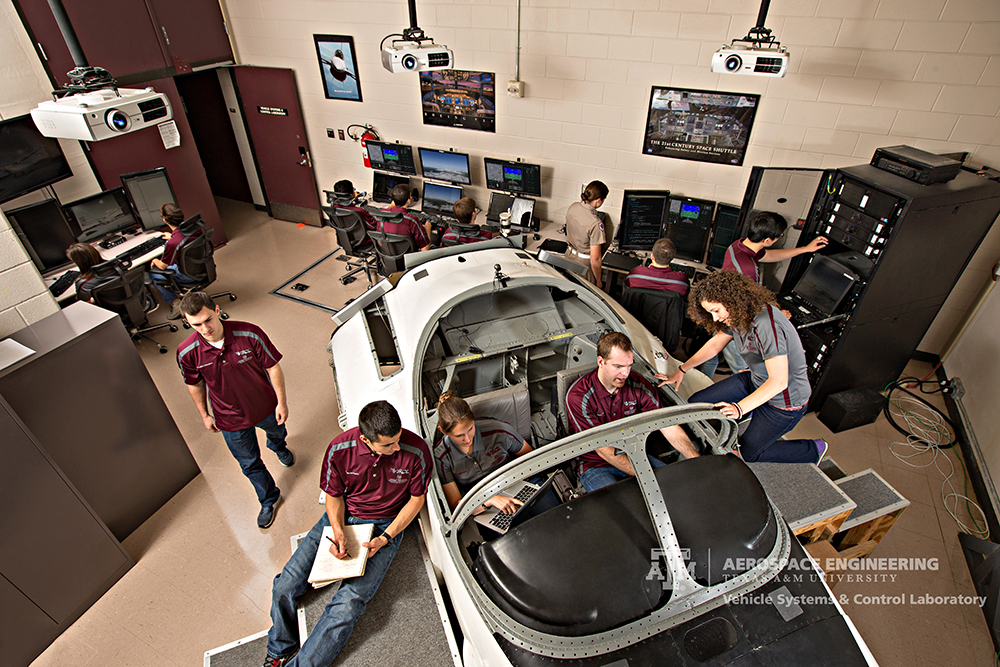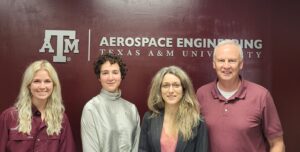 VSCL hosted Dr. Dimitra Panagou, Associate Professor with the Department of Robotics, and the Department of Aerospace Engineering Department, University of Michigan. Dr. Panagou met with Lab Director Dr. John Valasek and several VSCL Graduate Students. Dr. Panagou gave a presentation on Tunable Control Barrier Functions for Multi-Agent Safety Via Trust Adaptation and discussed UAS autonomy research and safe and resilient (secure) multi-agent systems.
VSCL hosted Dr. Dimitra Panagou, Associate Professor with the Department of Robotics, and the Department of Aerospace Engineering Department, University of Michigan. Dr. Panagou met with Lab Director Dr. John Valasek and several VSCL Graduate Students. Dr. Panagou gave a presentation on Tunable Control Barrier Functions for Multi-Agent Safety Via Trust Adaptation and discussed UAS autonomy research and safe and resilient (secure) multi-agent systems.
Kameron Eves Defends Ph.D. Dissertation on Wednesday, 1 March 2023
Kameron Eves (B.S. Mechanical Engineering, BYU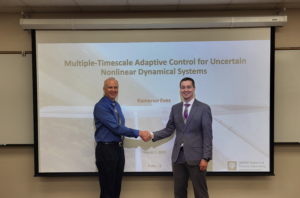 ) successfully defended his Ph.D. dissertation titled “Multiple-Timescale Adaptive Control for Uncertain Nonlinear Dynamical Systems”. Kameron’s dissertation investigated combining nonlinear multiple time-scale controllers that VSCL has been researching for the last 15 years, with adaptive controllers which VSCL has been researching for more than 20 years. Multiple-timescale control has been shown to have difficulty with uncertain systems and adaptive control has been shown to have difficulty with multiple-timescale systems. His dissertation describes a novel control methodology called [K]Control of Adaptive Multiple-timescale Systems (KAMS). KAMS seeks to address systems that simultaneously exhibit uncertain and multiple-timescale behaviors. Unlike traditional multiple-timescale control literature, KAMS uses adaptive control to stabilize the subsystems. The reference models and adapting parameters used in adaptive control significantly complicate the stability analysis. KAMS is a flexible theory and framework and the stability proofs apply to a wide array of adaptive algorithms and multiple-timescale fusion techniques. Additionally, formal and numerical validation of how KAMS can relax the minimum phase assumption for a multitude of common adaptive control methods. KAMS is demonstrated and evaluated on examples consisting of stabilization and attitude control of a quadrotor Unmanned Air System; fuel-efficient orbital transfer maneuvers; and preventing inlet unstart on hypersonic aircraft.
) successfully defended his Ph.D. dissertation titled “Multiple-Timescale Adaptive Control for Uncertain Nonlinear Dynamical Systems”. Kameron’s dissertation investigated combining nonlinear multiple time-scale controllers that VSCL has been researching for the last 15 years, with adaptive controllers which VSCL has been researching for more than 20 years. Multiple-timescale control has been shown to have difficulty with uncertain systems and adaptive control has been shown to have difficulty with multiple-timescale systems. His dissertation describes a novel control methodology called [K]Control of Adaptive Multiple-timescale Systems (KAMS). KAMS seeks to address systems that simultaneously exhibit uncertain and multiple-timescale behaviors. Unlike traditional multiple-timescale control literature, KAMS uses adaptive control to stabilize the subsystems. The reference models and adapting parameters used in adaptive control significantly complicate the stability analysis. KAMS is a flexible theory and framework and the stability proofs apply to a wide array of adaptive algorithms and multiple-timescale fusion techniques. Additionally, formal and numerical validation of how KAMS can relax the minimum phase assumption for a multitude of common adaptive control methods. KAMS is demonstrated and evaluated on examples consisting of stabilization and attitude control of a quadrotor Unmanned Air System; fuel-efficient orbital transfer maneuvers; and preventing inlet unstart on hypersonic aircraft.
A proposal on KAMS was submitted to DoD sponsors, and the Office of Naval Research (ONR) awarded a three-year research project to continue this work, and flight test it. Conference and journal papers are being written on this work.
Kameron’s is the 57th graduate degree earned by a VSCL graduate student. Kameron graduated from the Mechanical Engineering Department at BYU in 2019, with minors in mathematics and business. At BYU, Kameron worked in the Multiple Agent Intelligent Coordination and Control (MAGICC) laboratory. He will be starting work as an Assistant Professor at Utah Tech University in June.
VSCL Student Presents at ACC
VSCL graduate student Kameron Eves will present a paper in May at the 2023 American Control Conference (ACC) in San Diego, California.
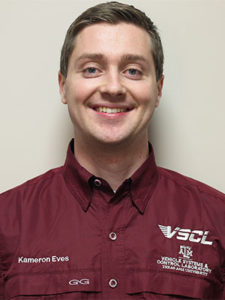 Kameron Eves will be presenting the paper “Adaptive Control for Non-minimum Phase Systems Via Time Scale Separation,”. Adaptive control for non-minimum phase systems remains a challenging problem. Eves proposes a method of adaptive control for systems that may be both nonlinear and non-minimum phase. This is accomplished by exploiting time scale separation between the internal and external dynamics.
Kameron Eves will be presenting the paper “Adaptive Control for Non-minimum Phase Systems Via Time Scale Separation,”. Adaptive control for non-minimum phase systems remains a challenging problem. Eves proposes a method of adaptive control for systems that may be both nonlinear and non-minimum phase. This is accomplished by exploiting time scale separation between the internal and external dynamics.
VSCL Senior Alexander Gross Receives College of Engineering Fellowship
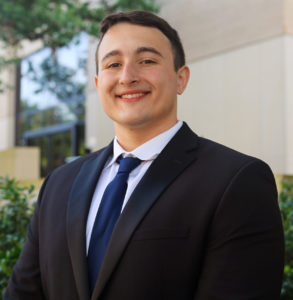
VSCL Undergraduate Research Assistant Alex Gross is one of two AERO student recipients of the new College of Engineering Horizons: 21 Fellowships for 21st Century Scholars (EHDF). The EHDF provides 21 research fellowships for domestic students beginning their PhD program at Texas A&M University. This fellowship includes a $30,000 fellowship stipend provided by the College of Engineering (COE) during the first year of doctoral studies, full tuition and required student fees for full-time enrollment, a professional development scholarship of $1,500 for first year, mentorship, and funding provided by the Department of Aerospace Engineering via a Graduate Assistantship (Teaching or Research) during subsequent years.
Gross is an Engineering Honors undergraduate student pursuing his B.S. degree in aerospace engineering with minors in mathematics and computer science. He is currently a Year-Round Undergraduate Research and Development Intern at Sandia National Laboratories, working on the Autonomy for Hypersonics program. Gross is a recipient of the prestigious AIAA Cary Spitzer Digital Avionics Scholarship, the Herman F. Heep Scholarship, the Benjamin R and Deaana J Smith Scholarship, and the Dean’s Honor Roll. Gross is currently President of the TAMU AIAA Student Branch, and Secretary of the TAMU Students for the Exploration and Development of Space. He is a 2020 award-Winning Proposal recipient of the L’SPACE NASA Proposal Writing and Evaluation Experience Academy.
Gross has been a member of VSCL since 2020 and is currently working on the research project Enhancing the Cycle-of-Learning for Autonomous Systems to Facilitate Human-Agent Teaming , and he has contributed to the Autonomous Intelligent Detection Tracking and Recognition (AIDTR) and Agile Technology Development (ATD) – Air-Ground Coordinated Teaming projects. He also Investigated and developed reinforcement learning algorithms for training of Mars rover vehicles for NASA JPL. His research interests are on UAS autonomous guidance and landing, embedded systems, and user-interface integration. His goal is to work in the aerospace industry as a vehicle guidance, navigation and control engineer for spaceflight vehicles.
VSCL students present at AIAA SciTech Forum
VSCL graduate students Kameron Eves and David Van Wijk will present papers in January at the 2023 AIAA SciTech Forum in National Harbor, MD.
 Kameron Eves will be presenting the paper “Introduction to Adaptive Control for Multiple Time Scale Systems”. Eves presents a novel approach to Adaptive Control for Multiple Time Scale Systems with [K]Control of Adaptive Multiple Time Scale Systems (KAMS). KAMS fuses two adaptive control signals using multiple time scale techniques. Generalized formal definitions, stability criteria, and examples are developed and presented for each method. Results show that [K]Control of Adaptive Multiple Time Scale
Kameron Eves will be presenting the paper “Introduction to Adaptive Control for Multiple Time Scale Systems”. Eves presents a novel approach to Adaptive Control for Multiple Time Scale Systems with [K]Control of Adaptive Multiple Time Scale Systems (KAMS). KAMS fuses two adaptive control signals using multiple time scale techniques. Generalized formal definitions, stability criteria, and examples are developed and presented for each method. Results show that [K]Control of Adaptive Multiple Time Scale
Systems has the best performance because each reduced-order model is stabilized separately and because the fast dynamics converge to the manifold more quickly than the other methods.
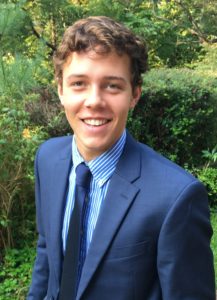 David Van Wijk will be presenting the paper “Deep Reinforcement Learning Controller for Autonomous Tracking of Evasive Ground Target”. Van Wijk presents a method of tracking an evasive ground target using deep RL on a rotorcraft wherein the target attempts to hide behind occlusions. A variety of environment conditions are trained and evaluated, resulting in an agent able to successfully track a randomly moving target with the presence of occlusions.
David Van Wijk will be presenting the paper “Deep Reinforcement Learning Controller for Autonomous Tracking of Evasive Ground Target”. Van Wijk presents a method of tracking an evasive ground target using deep RL on a rotorcraft wherein the target attempts to hide behind occlusions. A variety of environment conditions are trained and evaluated, resulting in an agent able to successfully track a randomly moving target with the presence of occlusions.
Garrett Jares Defends Ph.D. Dissertation on Thursday, 1 December 2022
Garrett Jares (B.S. Computer Science, Texas A&M University) successfully defended his Ph.D. dissertation titled “Control Acquisition Attack of Feedback Control System by False Data Injection”. Garrett is a recipient of the National Science Foundation Graduate Research Fellowship to support his research in Aerospace Cybersecurity. Garrett has accepted a position as a Research Engineer with Southwest Research Institute. He is currently a member of the American Institute of Aeronautics and Astronautics Cybersecurity Working Group, and his main research interests include cybersecurity and cryptography applied to air and space systems. Congratulations Garrett, all of VSCL is very proud of you and your accomplishments!
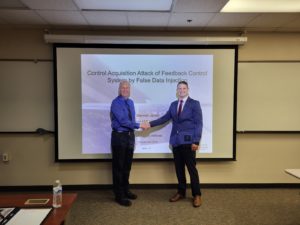
VSCL Alumnus Bowers Awarded Northrop Grumman Fellow

Roshawn Bowers ’03 & ’05, a former student in the Department of Aerospace Engineering at Texas A&M University, has been awarded a Northrop Grumman Fellow for Vehicle Management Systems and Flight Control Systems Integration. She is also co-sponsoring a new program at Northrop Grumman that focuses on recruiting and retaining women in senior technical roles. Bowers is currently an engineering manager who leads the development of advanced engineering systems for Northrop Grumman Aeronautics Systems in San Diego, California.
“I am very fortunate to have had great teachers and mentors to help me along the way,” said Bowers. “I feel like I got a first-class education at Texas A&M, and I don’t believe any other university could have prepared me better for my career.”
As an undergraduate and graduate student, Bowers conducted research in the Vehicle Systems & Control Laboratory with Dr. John Valasek, professor in the aerospace engineering department. She researched relative navigation systems and assisted with flight testing of an unmanned powered parachute vehicle for NASA’s X-38 project. At the conclusion of her graduate degree, she defended her Master of Science thesis titled “Estimation algorithm for autonomous aerial refueling utilizing a vision based relative navigation system” in April 2005 and then joined Northrop Grumman.
Previously, Bowers had done co-op tours at Lockheed Martin Space Operations in Houston on the International Space Station Extravehicular Activity Test Team and the Environmental Control and Life Support Systems team. She also did a co-op on the F-16 Block 60 program for Lockheed Martin Aeronautics in Fort Worth, Texas.
While in school at Texas A&M, Bowers researched the Automatic Carrier Landing System as a member of the Engineering Scholars Program and received the Texas A&M Graduate Merit Fellowship and the Isadore Roosth ’33 Engineering Scholarship. She was the chairman of Sigma Gamma Tau, the Aerospace Engineering Honor Society, and a member of Phi Eta Sigma, the Freshman Honor Society. Bowers participated in the Texas A&M Engineering High School Conference, Help One Student To Succeed (HOSTS), and Aggie Replant.
The official College of Engineering press release can be found here.
Clouatre, Valasek, Balas, and Gehlot Publish “Linear Quantum State Observers”
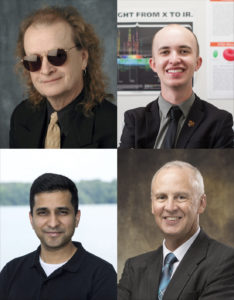 On September 28, 2022, Maison Clouatre and John Valasek of VSCL, in tandem with Mark Balas of the Texas A&M Mechanical Engineering Department and Vinod Gehlot of NASA Jet Propulsion Laboratory, published the paper “Linear Quantum State Observers” in IEEE Transactions on Quantum Engineering. This paper develops fundamental results for using linear observers to infer an unknown state of a quantum dynamical system. The theoretical contributions of the article are three-fold:
On September 28, 2022, Maison Clouatre and John Valasek of VSCL, in tandem with Mark Balas of the Texas A&M Mechanical Engineering Department and Vinod Gehlot of NASA Jet Propulsion Laboratory, published the paper “Linear Quantum State Observers” in IEEE Transactions on Quantum Engineering. This paper develops fundamental results for using linear observers to infer an unknown state of a quantum dynamical system. The theoretical contributions of the article are three-fold:
- A quantum observability test is provided in terms of two “quantum observability matrices”. This test is shown to be more computationally efficient than testing the Kalman observability matrix of the same quantum system.
- A canonical quantum state observer is derived, which guarantees that the observer error tends to the unobservable space of any quantum system with positive operator valued measure (POVM) output.
- The canonical observer preserves the Hermiticity of the observer’s state. This allows one to efficiently project the observer’s state onto the set of valid quantum density matrices while
retaining the convergence rate of the observer.
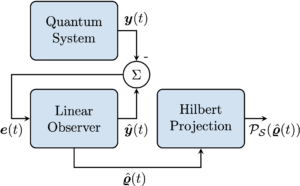 This publication is part of VSCL’s ongoing work in the area of control for quantum information systems. The early access version of the article can be viewed on IEEE’s website: https://ieeexplore.ieee.org/document/9904875.
This publication is part of VSCL’s ongoing work in the area of control for quantum information systems. The early access version of the article can be viewed on IEEE’s website: https://ieeexplore.ieee.org/document/9904875.
Graduate Student Maison Clouatre awarded National Defense Science Engineering Graduate Fellowship (NDSEG) and National Science Foundation Graduate Research Fellowship (NSFGR)
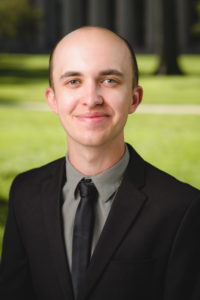 Maison Clouatre, a graduate student in the Department of Aerospace Engineering at Texas A&M University, has received two prestigious awards, the 2022 National Defense Science and Engineering Graduate (NDSEG) Fellowship and the 2022 National Science Foundation Graduate Research Fellowships Program (GRFP). Clouatre selected the NDSEG Fellowship, which is awarded annually to students in recognition of their academic excellence and STEM (science, technology, engineering and math) achievements. Awardees receive full tuition and coverage for all mandatory fees for up to three years at any accredited U.S. college or university that provides advanced degrees in science and engineering, as well as a monthly stipend of $3,400.
Maison Clouatre, a graduate student in the Department of Aerospace Engineering at Texas A&M University, has received two prestigious awards, the 2022 National Defense Science and Engineering Graduate (NDSEG) Fellowship and the 2022 National Science Foundation Graduate Research Fellowships Program (GRFP). Clouatre selected the NDSEG Fellowship, which is awarded annually to students in recognition of their academic excellence and STEM (science, technology, engineering and math) achievements. Awardees receive full tuition and coverage for all mandatory fees for up to three years at any accredited U.S. college or university that provides advanced degrees in science and engineering, as well as a monthly stipend of $3,400.
Clouatre, a Ph.D. student, graduated in May 2022 with a double major in electrical engineering and mathematics from Mercer University. He is both a Goldwater Scholar and Stamps Scholar, and previously held visiting research positions in the Electronic Systems (ELSYS) Laboratory at the Georgia Tech Research Institute (GTRI) and the Laboratory for Information & Decision Systems (LIDS) at the Massachusetts Institute of Technology (MIT).
Clouatre is co-advised by professor John Valasek in the aerospace engineering department, and professor Mark Balas in the mechanical engineering department. He first experienced engineering at Texas A&M University as an NSF Research Experience for Undergraduates (REU) student in 2019, working with Valasek in the Vehicle Systems & Control Laboratory (VSCL). Clouatre says “It is an overwhelming honor to receive the support of both NSF GRFP and DoD NDSEG. However, without Professor Valasek, who has persistently invested in me since I was a freshman in college, these awards would not be possible. His most recent investment was introducing me to Professor Balas—a kind mentor and truly keen mind. After carefully considering both awards, I zealously look forward to using the NDSEG fellowship to innovate alongside Valasek and Balas as a graduate student at Texas A&M University.”
Clouatre’s research interests lie at the intersection of control theory, optimization, and learning, and he ventures to use these techniques to engineer advanced quantum information devices. His NDSEG application identified a major hurdle for moving beyond Noisy Intermediate Scale Quantum (NISQ) devices: quantum bits which are strongly coupled with their environment. In such regimes, a quantum bit dissipates quantum information into its environment and limits the lifetime of data stored in the qubit’s state. Clouatre will use the NDSEG fellowship to work with Professors Valasek and Balas to develop new quantum control schemes which mitigate environmental couplings and lead to more robust quantum information units.
Valasek says that Clouatre “Maison is an exceptional person, and student, that personifies ‘hard work really does pay off’. He brings tremendous energy and enthusiasm to learning and research, and especially elevates the experience of everyone around him. I enjoyed working with him very much during REU, and now that he is attending TAMU for his doctorate I get to work with him every day. We are very fortunate to have him in the Vehicle Systems & Control Laboratory.”
VSCL Alumnus Mia Brown Accepts Position at NASA Johnson Space Center
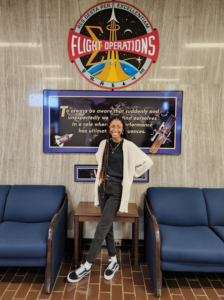
VSCL Alumnus Mia Brown ’20 has accepted a new position as a Flight Controller at NASA Johnson Space Center. Mia will be working as a flight controller in mission control for the Robotics Team (ROBO). The job of a flight controller in mission control is to plan and help execute missions to/from the International Space Station (ISS). As part of team ROBO, Mia will work with the Canadian Space Agency (CSA) to operate the robotic arm and primarily focus on fixing things on the outside of the ISS, capturing/releasing vehicles that come aboard the space station, and also assist with crew extravehicular activity (EVA) missions.
Mia is a graduate of the Department of Computer Science and Engineering with a major in Computer Engineering. She started working with VSCL in the Spring of 2017, with her major roles including working in the Texas A&M University Engineering Flight Simulator and helping to develop a means for evaluating human factors aspects for Head Mounted Displays (HMD) for Enhanced Vision System technologies. Previously, Mia worked for Dell Technologies as a Security Analyst where she helped to manage the security of Dell’s information.

